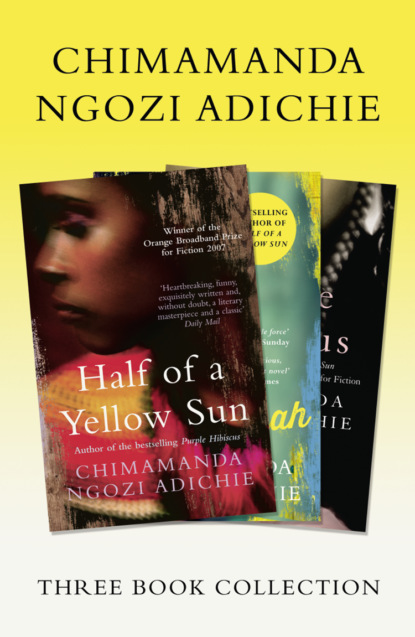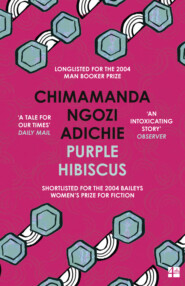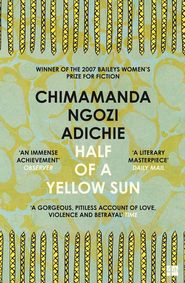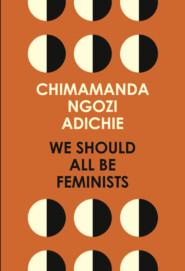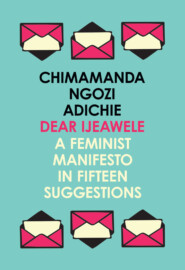По всем вопросам обращайтесь на: info@litportal.ru
(©) 2003-2024.
✖
Half of a Yellow Sun, Americanah, Purple Hibiscus: Chimamanda Ngozi Adichie Three-Book Collection
Автор
Год написания книги
2018
Настройки чтения
Размер шрифта
Высота строк
Поля
‘Rubbish!’ Master shouted. ‘Did you hear that? Did you hear that?’
‘Yes, sah,’ Ugwu said. He hoped the loud noise would not wake Baby up from her siesta.
‘Impossible!’ Master said.
‘Sah, your soup,’ Ugwu said.
‘Five-hundred people killed. Absolute rubbish! It can’t be true.’
Ugwu took the dish into the kitchen and put it in the refrigerator. The smell of spices nauseated him, as did the sight of soup, of food. But Baby would wake up soon and he would have to make her dinner. He brought out a bag of potatoes from the storeroom and sat staring at it, thinking about two days ago, when Olanna left for Kano to fetch Aunty Arize, how her plaited hair had pulled at the skin of her forehead and made it shiny-sleek.
Baby came into the kitchen. ‘Ugwu.’
‘I tetago? Are you awake?’ Ugwu asked, before he hugged her. He wondered if Master had seen her walk past the living room. ‘Did you see baby chickens in your dream?’
Baby laughed, and her dimples sank deep in her cheeks. ‘Yes!’
‘Did you talk to them?’
‘Yes!’
‘What did they say?’
Baby didn’t give the usual response. She let go of his neck and squatted on the floor. ‘Where is Mummy Ola?’
‘Mummy Ola will be back soon.’ Ugwu examined the blade of the knife. ‘Now, help me with the potato peels. Put them all in the dustbin, and when Mummy Ola comes back, we will tell her you helped with the cooking.’
After Ugwu put the potatoes on to boil, he gave her a bath, dusted her body over with Pears talcum powder, and brought out her pink nightdress. It was the one Olanna loved, the one she said made Baby look like a doll. But Baby said, ‘I want my pyjamas,’ and Ugwu was no longer sure which it was Olanna loved anyway, the nightdress or the pyjamas.
He heard a knock on the front door. Master ran out of his study. Ugwu dashed to the door and grasped the handle first and held on, so that he would be the one to open it, although he knew it couldn’t be Olanna. She had her own key.
‘Is it Obiozo?’ Master asked, looking at one of the two men standing at the door. ‘Obiozo?’
When Ugwu saw the hollow-eyed men with the dirt-smeared clothes, he knew right away that he should take Baby away, shield her. He took her food into the bedroom, set it on her play table, and told her she could pretend she was eating with Jill from the Jack and Jill comic that was delivered with the Renaissance. He stood by the door that led to the corridor and peered into the living room. One of the men was speaking, while the other drank from a bottle of water, the glass ignored on the table.
‘We saw a lorry driver who agreed to carry us,’ the man said, and Ugwu could tell right away that he was Master’s kinsman; his Abba dialect was heavy, each f sounding like a v.
‘What happened?’ Master asked.
The man placed the bottle of water down and said quietly, ‘They are killing us like ants. Did you hear what I said? Ants.’
‘Our eyes have seen plenty, anyi afujugo anya,’ Obiozo said. ‘I saw a whole family, a father and mother and three children, lying on the road to the motor park. Just lying there.’
‘What about Kano? What is happening in Kano?’ Master asked.
‘It started in Kano,’ the man said.
Obiozo was speaking, saying something about vultures and bodies dumped outside the city walls, but Ugwu no longer listened. It startedin Kano rang in his head. He did not want to tidy the guest room and find bedsheets and warm the soup and make fresh garri for them. He wanted them to leave right away. Or, if they would not leave, he wanted them to shut their filthy mouths. He wanted the radio announcers to be silent too, but they were not. They repeated the news of the killings in Maiduguri until Ugwu wanted to throw the radio out of the window, and the next afternoon, after the men left, a solemn voice on ENBC Radio Enugu recounted eyewitness accounts from the North: teachers hacked down in Zaria, a full Catholic church in Sokoto set on fire, a pregnant woman split open in Kano. The newscaster paused. ‘Some of our people are coming back now. The lucky ones are coming back. The railway stations are full of our people. If you have tea and bread to spare, please take it to the stations. Help a brother in need.’
Master leapt up from the sofa. ‘Go, Ugwu,’ he said. ‘Take tea and bread and go to the railway station.’
‘Yes, sah,’ Ugwu said. Before he made the tea, he fried some plantains for Baby’s lunch. ‘I have put Baby’s lunch in the oven, sah,’ he said.
He was not sure Master heard him and as he left, he worried that Baby would go hungry and Master would not know that her fried plantains were in the oven. He made himself keep worrying about it until he got to the station. Mats and dirty wrappers were spread all over the platform and people were crumpled down on them, men and women and children crying and eating bread and tending wounds. Hawkers walked around with trays on their heads. Ugwu did not want to go into that ragged bazaar but he steeled himself and walked towards a man sitting on the ground with a red-stained rag wound around his head. Flies buzzed everywhere.
‘Do you want some bread?’ Ugwu asked.
‘Yes, my brother. Dalu. Thank you.’
Ugwu did not look to see how deep the knife wound on his head was. He poured the tea and held out the bread. He would not remember this man tomorrow because he would not want to.
‘Do you want some bread?’ Ugwu asked another man nearby, who sat hunched. ‘I choro bread?’
The man turned. Ugwu recoiled and nearly dropped the flask. The man’s right eye was gone, in its place, a juicy-red pulp.
‘It was the soldiers who saved us,’ the first man was saying, as if he felt he had to tell his story in exchange for the bread he was eating dipped in tea. ‘They told us to run to the army barracks. Those madmen were chasing us like runaway goats, but once we entered the gates of the barracks, we were safe.’
A rickety train pulled up, so full that some people held on to the outside of the coaches, clutching at metal bars. Ugwu watched as tired, dusty, bloody people climbed down, but he did not join those who rushed over to help. He could not bear to think that Olanna was one of those limping and defeated people, and yet he could not bear to think that she was not, that she was still behind, somewhere in the North. He watched until the train emptied out. Olanna was not there. He gave the rest of the bread to the one-eyed man, then turned and ran. He did not stop until he got to Odim Street and past the bush with the white flowers.
11 (#u3c1576f1-c916-57b7-bb43-a63c028a7109)
Olanna was sitting on Mohammed’s veranda, drinking chilled rice milk, laughing at the delicious cold trickle down her throat, at the stickiness on her lips, when the gateman appeared and asked to speak to Mohammed.
Mohammed left and came back moments later, holding what looked like a pamphlet. ‘They’re rioting,’ he said.
‘It’s the students, isn’t it?’ Olanna asked.
‘I think it’s religious. You must leave right away.’ His eyes avoided hers.
‘Mohammed, calm down.’
‘Sule said they are blocking the roads and searching for infidels. Come, come.’ He was already heading indoors. Olanna followed. He worried too much, did Mohammed. Muslim students were always demonstrating about one thing or the other, after all, and harassing people who were Western-dressed, but they always dispersed quickly enough.
Mohammed went into a room and came out with a long scarf. ‘Wear this, so you can blend in,’ he said.
Olanna placed it over her head and wound it round her neck. ‘I look like a proper Muslim woman,’ she joked.
But Mohammed barely smiled. ‘Let’s go. I know a short cut to the train station.’
‘Train station? Arize and I are not leaving until tomorrow, Mohammed,’ Olanna said. She almost ran to keep up with him. ‘I’m going back to my uncle’s house in Sabon Gari.’
‘Olanna.’ Mohammed started the car; it jerked as he took off. ‘Sabon Gari is not safe.’
‘What do you mean?’ She tugged at the scarf; the embroidery at the edges felt coarse and uncomfortable against her neck.
‘Sule said they are well organized.’
Olanna stared at him, suddenly frightened at how frightened he looked. ‘Mohammed?’





